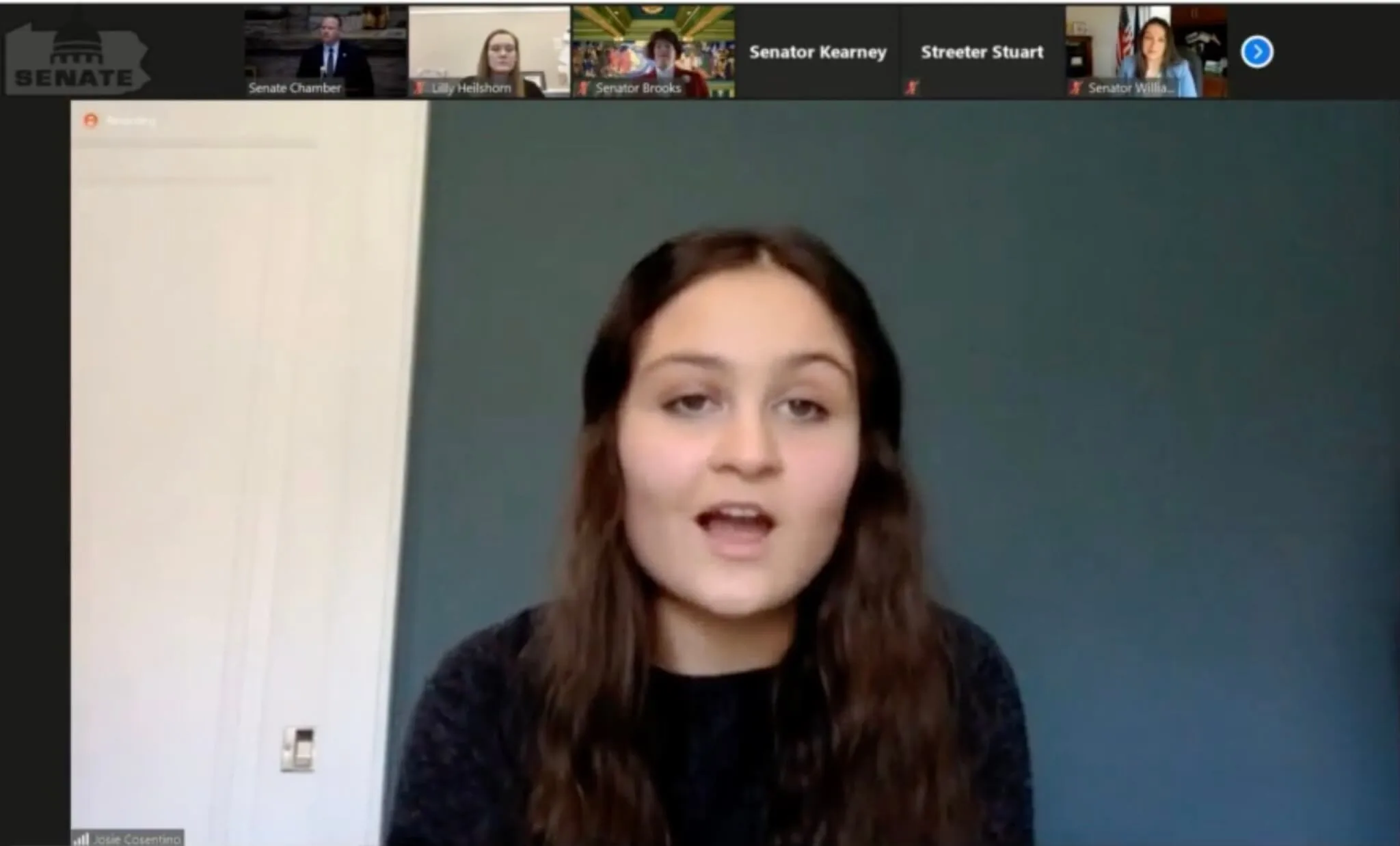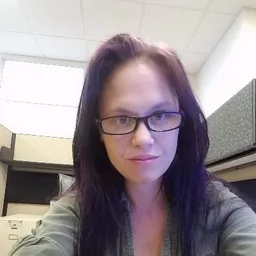
Josie Cosentino talks during a virtual hearing about the how students' mental health has been affected by the coronavirus pandemic. (Screenshot)
The coronavirus pandemic has profoundly impacted the mental well-being of children, causing their educational and social development to suffer.
Josie Cosentino is only 16, and she’s already making life or death decisions.
Cosentino, a junior at Mount Lebanon High School in Allegheny County, lives with her extremely immuno-compromised grandfather.
“When school moved to the hybrid option back in October, I had to make a decision not just for myself, but for the health of my grandfather,” Cosentino said during a recent public hearing about education during the pandemic. She chose to attend school virtually.
“It feels as though the quality of my education is being compromised because of a decision I made for the health of others,” she said. “It is hard to believe I live in a time where a choice between education and health is asked to be made.”
Every day, she worries about her grandfather, her education, her friends, and the pandemic.
“The world is falling apart, but all I can care about is making sure my essay has been turned in on time,” she said.
And she’s not alone.
Cosentino said many of her friends have fallen into a deep, painful depression.
“Students are hurting. Students are tired,” she said. “Students are completely and totally overwhelmed.”
“How can we expect students to function like normal when the world is anything but normal?” Cosentino asked.
Students of All Ages and Abilities Are Struggling During the Pandemic
Chad Williams is a married father of four children living in the Unionville-Chadds Ford School District in Chester County. He said his entire family has suffered mentally from the ongoing pandemic.
In the last year, Unionville has had fewer than 14 days of in-person instruction, Williams said. Virtual school for his two middle-aged children was such a disaster that he and his wife made the difficult decision to homeschool them until schools reopen.
His oldest daughter struggled so much he was forced to move her to a costly private school, putting a tremendous financial burden on his family.
“The psychological and emotional toll this has taken on my children is utterly tragic,” Williams said. “We as parents watch powerlessly and silently as our children suffer. How on earth did we allow this to happen?”
For Rachel Schlosser, the impact of the pandemic on her son’s mental and academic well-being might be life-long. Her son—a sixth grader in the Pittsburgh Public School District—has developmental and intellectual disabilities.
“The way his condition impacts how he learns is complex,” Schlosser said. “His disability means that any benefit from instruction delivered over video either live or pre-recorded requires 100% dedicated support in order to attempt any meaningful participation. This is a level of support my husband and I are unable to provide. He has missed an entire year of educational programming and has suffered significant mental health and behavioral regression.”
School Plays a Crucial Role in Children’s Mental Health
Online school is a poor substitute for in-person instruction, said Rob Mitchell, a Spanish teacher in the Pittsburgh School District.
“A screen is no match for a person that cares,” he said.
Plus, Mitchell said, it’s hard for teachers to engage students in a virtual classroom. Personal interaction is key to noticing the signs of mental instability. How can teachers help when their classroom is spread out across miles of an entire school district, he asked.
Schools play an important role in the healthy development of children, said Noe Ortega, acting secretary of the state Department of Education. Schools and in-person teaching provide academic growth, essential social development, nutrition access, and physical activity.
“Quite simply, our goal is to create the condition to return students to in-person instruction as safely as possible and as soon as possible,” Ortega said.
Education After the Pandemic
Simply focusing on opening school buildings will not solve the problem, said Janell Logue-Belden, superintendent of the Deer Lakes School District in Allegheny County.
Schools throughout the commonwealth have faced unprecedented challenges over the last year, said Samuel Lee, superintendent of the Bensalem Township School District in Bucks County. And it won’t stop with the end of the pandemic. Students will need help recovering from the abnormality and adjusting to normalcy again.
“We are doing the best we possibly can,” Lee said. “Academic progress has been compromised. We are deeply concerned about our students’ well-being.”
School districts across the state will need more mental health resources after the pandemic, Logue-Belden said. Guidance counselors are not mental health experts. Schools need dedicated mental health professionals on site to focus on the issues that will arise when in-person instruction resumes, she said.
Teachers will also need professional development training to handle the educational fallout from the pandemic, Logue-Belden said.
For Cosentino, she doesn’t understand why the pandemic can’t be viewed as an opportunity for positive change.
“It is unreasonable and irrational to expect students to sit on a Zoom meeting for seven hours a day, or make a life or death decision that determines the quality of their education,” she said. “I am not saying I have the solution to this. I am not saying there is a clear solution to any of this. But there is an opportunity—an opportunity to change how we do things, an opportunity to look at what is wrong and fix it, and an opportunity to evolve.”
Correction: This story was edited on March 19, 2021, to remove incorrect information.
Politics

Biden marks Earth Day by announcing $7 billion in solar grants
The Biden administration on Monday announced the recipients of its Solar For All Program, a $7 billion climate program that aims to lower energy...

6 terrifying things that could happen if the Comstock Act is used to target abortion
Does 1873 sound like a really, really long time ago? Well, that’s because it is—but if Republicans and far-right anti-abortion activists have their...

Sheetz hit with lawsuit for allegedly discriminating against minority job applicants
The Equal Employment Opportunity Commission filed suit against Sheetz and two subsidiary companies, alleging the Altoona-based chain discriminated...
Local News

Conjoined twins from Berks County die at age 62
Conjoined twins Lori and George Schappell, who pursued separate careers, interests and relationships during lives that defied medical expectations,...

Railroad agrees to $600 million settlement for fiery Ohio derailment, residents fear it’s not enough
Norfolk Southern has agreed to pay $600 million in a class-action lawsuit settlement for a fiery train derailment in February 2023 in eastern Ohio,...






